Modèles opérationnels
Le rapport « La situation mondiale des transferts monétaires » du CALP Network identifie plusieurs types de modèles opérationnels, dont les consortiums et les alliances, les mécanismes de distribution des transferts partagés, un modèle de distribution des transferts monétaires articulé autour d’une seule organisation et l’intégration de systèmes.
« La structure générale au sein de laquelle les organisations travaillent conjointement […] pour distribuer les transferts monétaires […] lors d’interventions et d’activités d’analyse, et de la conception et de la mise en œuvre de programmes. »
Notre définition d’un modèle opérationel
Accroître l’échelle des transferts monétaires permet de transformer la manière dont l’aide humanitaire est distribuée. Cette décision a des conséquences sur les rôles des organisations dans le cadre de plusieurs modèles opérationnels, et sur la capacité des modèles à établir un lien avec les systèmes de protection sociale. Un changement d’échelle aura également un impact sur les partenariats avec des fournisseurs de technologies et de services financiers et sur la manière dont différents modèles interagissent avec d’autres formes d’assistance.
Priorités actuelles
Depuis fin 2016, le CALP Network assure la coordination d’un programme d’apprentissage visant à répondre aux questions suivantes :
- Quels sont les modèles opérationnels disponibles pour les organisations mettant en œuvre les transferts monétaires ?
- Comment différents modèles ont-ils amélioré l’efficience, l’efficacité et la transparence des transferts monétaires dans divers contextes ?
- Quels sont les modèles opérationnels les plus appropriés dans chaque contexte ?
Nous continuerons de compiler et diffuser notre base de données probantes sur les modèles opérationnels.
Nous sommes également partenaire du consortium Cash Monitoring, Evaluation, Accountability, and Learning Organizational Network (CAMEALEON), piloté par le Conseil norvégien pour les réfugié·es, qui est responsable du suivi et de l’évaluation indépendantes du programme d’assistance monétaire à usages multiples du PAM au Liban. À ce titre, nous menons des recherches et des analyses concernant l’optimisation des ressources et la redevabilité au sein du modèle opérationnel.
Contenu présenté

Operational Models: Accountability to affected people
Webinar

MEAL in Emerging Operational Models
Webinar

CTP Operational Models Analytical Framework
Guidelines and Tools
The State of the World’s Cash Report launched by the CALP Network in February 2018 highlights trends in the uptake of various operational models for the delivery of cash at scale in humanitarian response. Current decision making on the choice between these various operational models is highly influenced by context, and by the policies and approaches of donor agencies. Decision making on...
Thematic lead
Contenu récent

Cash for Work Programmes Standard Operating Procedures – Lebanon
Guidelines and Tools
The document intends to define the roles of responsibilities of all the actors involved in the Cash for Work (hereinafter CfW) activities being developed by Action Contre la Faim (hereinafter ACF) and his partners in Lebanon.

Croix-Rouge philippine Projet pilote de préparation à la réalisation de transferts monétaires
Rapport
La Fédération internationale a travaillé avec les quatre pays pilotes entre mai 2012 et décembre 2013 pour que ces Sociétés nationales puissent répondre sur une grande échelle aux besoins en secours à l’aide de programmes de transferts monétaires, en les mettant en oeuvre plus...

Cash Preparedness in Senegal: Cash Transfer Mechanisms
Report
Recognizing the growing importance of cash-based responses in humanitarian interventions and building on its own experience of implementing cash transfer programs through local partner organizations in Senegal in 2010 and 2012, Oxfam America sought to hire a consultant to determine the most feasible...
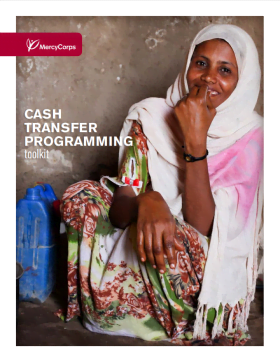
Cash Transfer Programming Toolkit
Guidelines and Tools
The Cash Transfer Programming (CTP) Toolkit is a basic guide to cash transfer programming in emergency response and early recovery settings. The publication is based upon best practiced and practical experience from Mercy Corps programmes. The Toolkit provides general guidance for CTP, as well as...
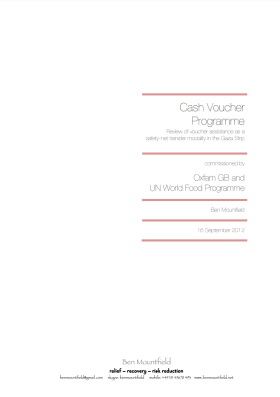
Cash Voucher Programme: Review of voucher assistance as a safety-net transfer modality in the Gaza Strip
Report
This review commissioned by Oxfam GB and WFP, looks at the effect of the Cash Voucher Project of WFP / Oxfam / Ma’an (CVP) on beneficiaries in Gaza. The review studies the impact on beneficiary diets and interviews beneficiaries to obtain their opinion on cash vouchers over in-kind food aid. The review...
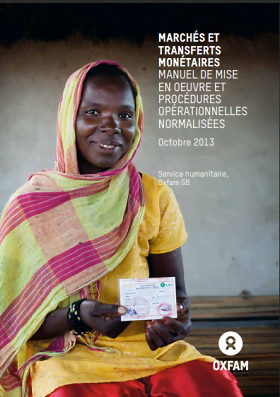
Marchés et transferts monétaires. Manuel de mise en oeuvre et procédures opérationnelles normalisées
Guides et outils
Au cours des dix dernières années et plus particulièrement depuis 2009, l’utilisation, par Oxfam, des transferts monétaires et des coupons comme outil d’intervention lors des urgences humanitaires a augmenté de façon significative. Si en 2009 les PTM ne représentaient que 2,5 % du...

Logistics and Administration Guideline for Cash Based Interventions
Guidelines and Tools
Cash-based interventions (CBIs) are increasingly included in humanitarian relief efforts as alternatives or complements to in-kind assistance. This guideline is mainly dedicated to logisticians and administrators to successfully support CBIs but also to technical departments. The objectives of this...

Logistics and Administration Guideline for Cash Based Interventions – Annexes
Guidelines and Tools
These annexes are designed to be used alongside the Logistics and Administration Guideline for Cash Based Interventions, which aims to support logisticians and administrators to successfully support cash based interventions (CBIs) and to help technical departments too. The annexes include: a the CALP...

Impact Evaluation of Cash and Food Transfers for the Seasonal Emergency Safety Net in Hajjah and Ibb Governorates, Yemen Endline Report
Report
This report is the final impact evaluation of the World Food Programme’s Cash and Food transfer program in Yemen. The program operated in Hajjah and Ibb governorates within the larger Emergency Safety Net (ESN), which provides assistance to qualifying households in rural Yemen. The report details the...

Guidelines for Public Works Programmes: Cash‐, Voucher‐ and Food-for‐Work
Guidelines and Tools
The Food and Agriculture Organization of the United Nations (FAO) manages public works programmes to provide transfers to vulnerable, food-insecure and/or crisis-affected households in return for the provision of labour (particularly through labour-intensive construction and...
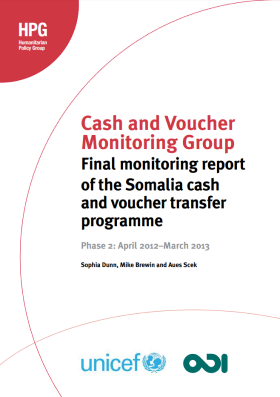
Final Monitoring Report of the Somalia Cash and Voucher Transfer Programme
Report
This report presents the findings of Phase 2 of a monitoring exercise of the Cash and Voucher Monitoring Group (CVMG), a unique partnership involving non-governmental organisations (NGOs) providing cash-based interventions in response to famine and humanitarian emergencies in South Central Somalia. It...
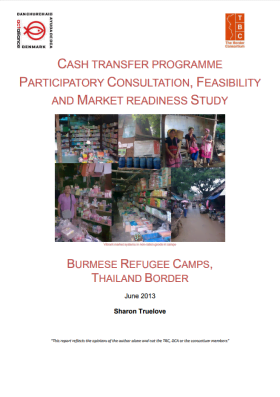
Cash Transfer Programme Participatory Consultation, Feasibility and Market Readiness Study: Burmese refugee camps, Thailand border
Report
This report is a participatory consultation, cash feasibility and market readiness study of the Burmese refugee camps on the Thailand border. It is a rapid, snap shot guide as to whether the conditions in two contrasting camps out of the full nine camps are conducive to a switch from the current ration...

Cash Emergency Preparedness (CEP) Assessment: Myanmar
Policy paper
Cash transfer programming (CTP) in emergencies is not new in Myanmar, with the first examples going back at least to Cyclone Nargis in 2009. CTP has also been used in humanitarian settings such as Kachin State. However, CTP is not yet being widely used for the current conflict context in Rakhine State due...
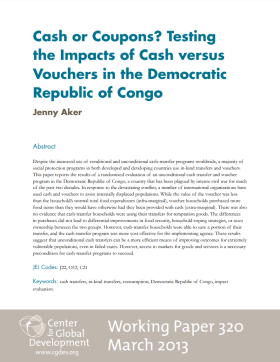
Cash or Coupons? Testing the impacts of cash transfers versus vouchers in the Democratic Republic of Congo
Report
Despite the increased use of conditional and unconditional cash-transfer programs worldwide, a majority of social protection programs in both developed and developing countries use in-kind transfers and vouchers. This paper reports the results of a randomized evaluation of an unconditional cash transfer...

Buttressing Supply Chains Against Floods in Asia for Humanitarian Relief and Economic Recovery
Report
Floods are the most frequent category of disasters worldwide. Among all geographical regions, Asia has suffered the most. While there are several ongoing humanitarian efforts and initiatives, we believe there is a new opportunity to coordinate “last mile” humanitarian efforts in the event of a...
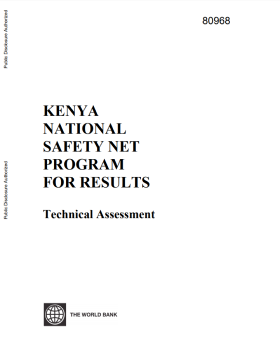
Technical Assessment of the Kenya National Safety Net Program for Results
Report
One of the priorities outlined in the National Social Protection Policy (NSPP) in Kenya, is the government’s ambition to enhance social assistance by developing the necessary institutions and strengthening operational systems while expanding the coverage of such programmes. To help realise this policy...

Les transferts monétaires dans la Commune de Roumbou ( Dakoro)
Rapport
Le présent rapport présente les données collectes au cour d’ un mois de recherche dans la Commune rurale de Roumbou,département de Dakoro Après avoir rappelé la méthodologie de la recherche, le rapport s’ articulera autour de points suivants: La Présentation du site de la recherche Le...
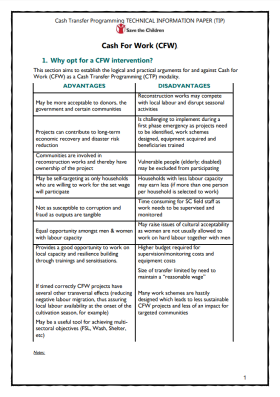
Cash Transfer Programming Technical Information Paper: Cash for work
Policy paper
This short and practical technical information paper published by Save the Children provides top-line guidelines for setting up cash for work (CFW) interventions. It includes: – Why opt for CFW intervention? – Planning for CFW – Implementing CFW – What are donors saying?

Predicting the Cost and Impact of Cash Transfer Programmes: The power of microsimulation tools
Policy paper
Oxford Policy Management has recently published a briefing note on using a micro-simulation tool to predict the cost and impact of cash transfer programmes. Cash transfers to households are becoming an increasingly common policy instrument for reducing poverty in some countries of sub-Saharan Africa. This...
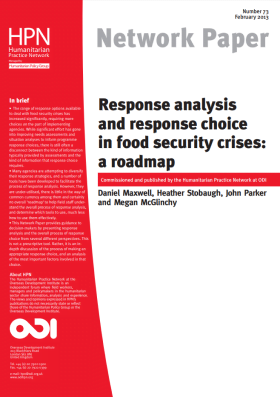
Response Analysis and Response Choice in Food Security Crises: A roadmap
Guidelines and Tools
The term ‘response analysis’ implies that response choices are made solely on the basis of evidence and analysis. However, many factors contribute to how agencies select a response, and ‘response choice’ does not always involve an evidence-based, analytical process. Recent research by The...



